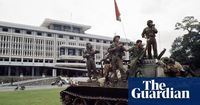The Vietnam War, lasting from 1955 to 1975, remains one of the most significant conflicts in modern history, with lasting impacts felt both in Vietnam and the United States. As Vietnam prepares to commemorate the 50th anniversary of the fall of Saigon, the narrative surrounding the war continues to evolve, reflecting a complex interplay of memory, trauma, and reconciliation.
The war, which resulted in the deaths of approximately 3.8 million people, was not merely a battleground for Cold War ideologies but also a struggle for Vietnam’s self-determination. For the United States, it was a fight against the spread of communism, while the Communist Party of Vietnam viewed American involvement as a form of colonialism. This dichotomy is encapsulated in the way the conflict is referred to in Vietnam as “the sacred resistance against the US to salvage the country” (Cuộc Kháng Chiến Chống Mỹ, Cứu Nước), or simply “the American war” (Chiến Tranh Mỹ).
April 30, now recognized as “Reunification Day” in Vietnam, marks the moment when North Vietnamese forces captured Saigon, leading to the reunification of the country. However, for many former citizens of South Vietnam, this date is a painful reminder of their defeat and the beginning of decades of political persecution, often referred to as the “Day of National Mourning” (Ngày Quốc Hận).
In the decades following the war, the portrayal of the Vietnam conflict in cinema has significantly shaped public perception. Films such as Francis Ford Coppola’s Apocalypse Now (1979), Stanley Kubrick’s Full Metal Jacket (1987), and Oliver Stone’s Platoon (1987) have dominated the American narrative, focusing on the psychological struggles of US soldiers while often sidelining the Vietnamese perspective. This has contributed to what is known as “the Vietnam syndrome,” a term describing the American public’s ambivalence towards military intervention following the war.
Conversely, cinema in Vietnam has evolved as well, with early films like Along the Same River (1959) and 17th Parallel, Days and Nights (1972) emphasizing the collective struggle against foreign aggression. As the political climate shifted, filmmakers began to explore the war’s impact on Vietnamese society more critically, as seen in The Girl on the River (1987) and Living in Fear (2005).
Recent productions like Spike Lee’s Da 5 Bloods (2020) have begun to highlight the experiences of Black American veterans, a perspective largely overlooked in earlier narratives. While these films still grapple with the complexities of the Vietnam War, they mark a significant shift towards inclusivity in storytelling.
As Vietnam approaches the 50th anniversary of the war's end, the government is preparing for grand commemorations, including parades and public speeches. However, the United States’ diplomatic engagement has been complicated. The Trump administration recently lifted a ban on senior diplomats attending anniversary events, allowing U.S. Consul General Susan Burns to participate in a reception in Ho Chi Minh City. However, U.S. Ambassador Marc E. Knapper was absent, raising concerns among Vietnam veterans about the U.S. commitment to reconciliation.
Critics of U.S. policy argue that the government has not fully understood the importance of acknowledging the past to foster healing. John Terzano, a founder of the Vietnam Veterans of America Foundation, expressed frustration, stating, “From where I sit, they don’t have a clue.” He emphasized that the U.S. must recognize the complexities of the Vietnam War and engage meaningfully with Vietnam as a strategic partner.
In an essay published just days before the anniversary, To Lam, Vietnam’s top leader, highlighted the power of personal reconciliation, noting the emotional encounters between Vietnamese and American veterans. This sentiment underscores the evolving relationship between the two nations, which has shifted from former adversaries to comprehensive strategic partners.
Amidst these developments, Vietnam faces challenges in balancing its relationships with both the U.S. and China. As tensions rise in the South China Sea, Vietnam remains wary of Chinese influence, seeking to maintain a diplomatic balance that promotes its own security and economic interests.
The legacy of the Vietnam War continues to resonate deeply within Vietnamese society. The psychological scars of the conflict, particularly among veterans and civilians, remain largely unaddressed. While the U.S. has recognized post-traumatic stress disorder (PTSD) among its veterans, the same acknowledgment has not been afforded to Vietnamese soldiers, whose struggles with trauma have been largely silenced by the Communist Party’s narrative.
Historian Martin Großheim notes that psychological issues related to the war were never officially recognized in Vietnam, as they did not fit the heroic narrative the government sought to promote. This has left many veterans and civilians grappling with their experiences in isolation.
In the years following the war, Vietnam has made significant strides in rebuilding its economy, transforming into one of the fastest-growing nations in the world. However, the scars of war remain. The impact of Agent Orange, which has affected millions, is still felt today, and the cleanup of unexploded ordnance continues to pose a threat to communities.
As Vietnam commemorates the 50th anniversary of the fall of Saigon, the nation reflects on its journey of recovery and reconciliation. The celebrations serve as both a tribute to those who sacrificed during the war and a reminder of the complex legacy that continues to shape Vietnam’s identity.
For many like Xuan Phuong, a war correspondent who witnessed the fall of Saigon, the anniversary is not just a celebration but a time for remembrance and reflection. Phuong, now 96, recalls the chaos of that day and the emotional toll it took on her and countless others. She emphasizes the importance of acknowledging the past, stating, “For those who want to ask about forgiveness, go and visit the cemetery. There are a lot of cemeteries in Vietnam filled with graves of people who died during the war.”
As Vietnam navigates its future, the lessons of the past remain vital in shaping a path toward healing and understanding, both within its borders and in its relationships with former adversaries.


